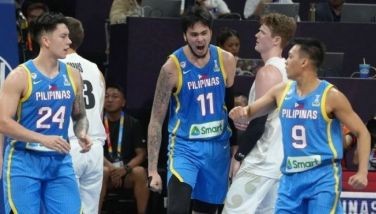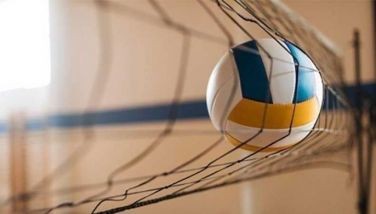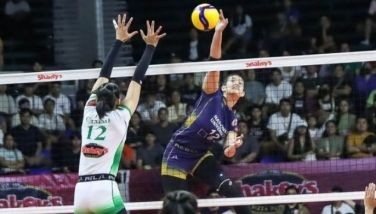The FIBA learnings
DUBAI, United Arab Emirates – Even in the high-pitched excitement for “Pinoy Pride 32: Duel in Dubai 2” here Friday, the big news was that the Philippines lost the bid to host the next FIBA World Cup, even with the support of international Filipino icons like boxing champion Manny Pacquiao and Hollywood actor Lou Diamond Phillips. Perhaps the whole scenario could have been summed up by the photo of Pacquiao dwarfed by retired Chinese NBA All-Star Yao Ming. Pacquiao is a product of private endeavor, a man who simply used his most basic talent and determination to become a world-beater. Yao is the product of a system, discovered and engineered by his government and practically owned by it until he was given a longer leash and allowed to go to the NBA. China even reprimanded Yao for taking too long on his honeymoon. Imagine our government trying to do that.
It was a great story, though. The passionate little developing archipelago against the monolithic new superpower. The fact that both nations eliminated all other competition is impressive enough. But as they say, nobody remembers who came in second. Except us.
In many ways, it stings more to have come so close than to have not been a contender at all. But as the cliché goes, it is great to be part of the conversation, to be in the door at this level. But the reality is that our political system has held back our progress as a nation, and that impacts our ability to win these types of contests. Obviously, FIBA does its homework, and a cursory examination of the newspapers and social media for the past few months does not give a good impression of the situation. The daily complaints about basic services, particularly the nauseating grind of traffic is enough to give even international businesses pause. We tolerate it because we have to. But nobody outside the country would want to put up with it.
There is no country on earth that loves basketball as passionately as the Philippines. That is almost a demonstrable fact. There are about 30 million Filipinos around the world, and those overseas workers’ prime entertainment are Philippine soap operas and basketball. Here in Dubai, Filipinos play hoops at least once a week at the grand multisport arena in the World Trade Centre and other places. In Brunei, for lack of after-work diversion, they troop to the courts no less than three times a week. Former PBA players like slam dunk champion Ruben dela Rosa moonlight as a referee here, earning a considerable amount for his expertise. PBA legends and show business personalities regularly make stops to play exhibition games in this developed desert power.
For entities like FIBA and the NBA, tapping a developing market like the Philippines entails two things: buying power and sustainable volume. It was easier in China, for the simple reason that, once the government took the lead, the citizens fell in line. There is no such culture in the Philippines, where political will is partial and fragmented, and personalities outweigh the greater good in many cases. We have the venues to hold the games, there is no question about that. But how do the visiting teams make their game times when traffic is at a standstill? And how long will it take them to get back to their hotels when the main highways themselves are clogged at peak hours in the mornings and evenings? We have to understand that this is unacceptable at the international level. Concert performers from the US routinely make Philippine audiences wait for up to two hours. You can’t do that at a FIBA competition. Now, if there were a five-star hotel beside each playing venue, then that would be a different story. The luxury ABS-CBN Sports have here in Dubai is that the Za’beel Halls where the fights were being held were only a 15-minute, air-conditioned walk from Novotel and Ibis hotels. We just basically needed to walk around the other convention halls.
China’s track record since being exposed to the sport has been impressive because of the sheer numbers. After the Atlanta Hawks’ first visit there in the 1980’s and Wang Zhizhi’s penetration of the NBA, the next step was finding a superstar who would attract the world’s largest audience to the game. Each time Yao Ming played for the Houston Rockets, an additional 20 million Chinese fans would tune in. You can’t get that kind of ratings boost from one country anywhere else in the world. And if the government sets its mind on creating infrastructure, they have the land to build it on. Let’s remember that China has hosted the Olympics, while the Philippines struggles to even get the Asian Games.
It was a valiant effort by the Samahang Basketbol ng Pilipinas, and I personally thank them. However, we cannot isolate their professionalism and preparedness from the larger milieu of the Philippines. Some may criticize and whine, and say that China does not love the sport as much. The fact is they can guarantee a smooth tournament, while the Philippines would need cooperation from government agencies of the next administration, and we don’t even know who that could be. How can we promise convenience? We can hire caterers, interpreters, guides, private security and fabulous hotels. But we cannot promise that everyone will be on time, and that the audiences will not be late for games. That is just one major concern. Traffic begets security issues, scheduling problems, food concerns. And once they get to their games, the foreign teams will be mobbed by fans, which may slow down entry to the venues. That is one problem of living in a democracy, you have to get along.
The Philippines has come a long way in basketball, and most of the credit belongs to Manny Pangilinan and his SBP team. That is the unvarnished truth. But, like the aforementioned image of Yao and Pacquiao, there has to be a bigger machinery in place, where we, as a nation, with a government that prides itself on systematized professionalism, are one in promising world-class hosting. And we can do it, really we can. Often, we just obstinately decide not to, though others are already showing the way. In either case, the Philippines made a sincere promise of what can be. China gave the cold guarantee of what is.
- Latest
- Trending
































